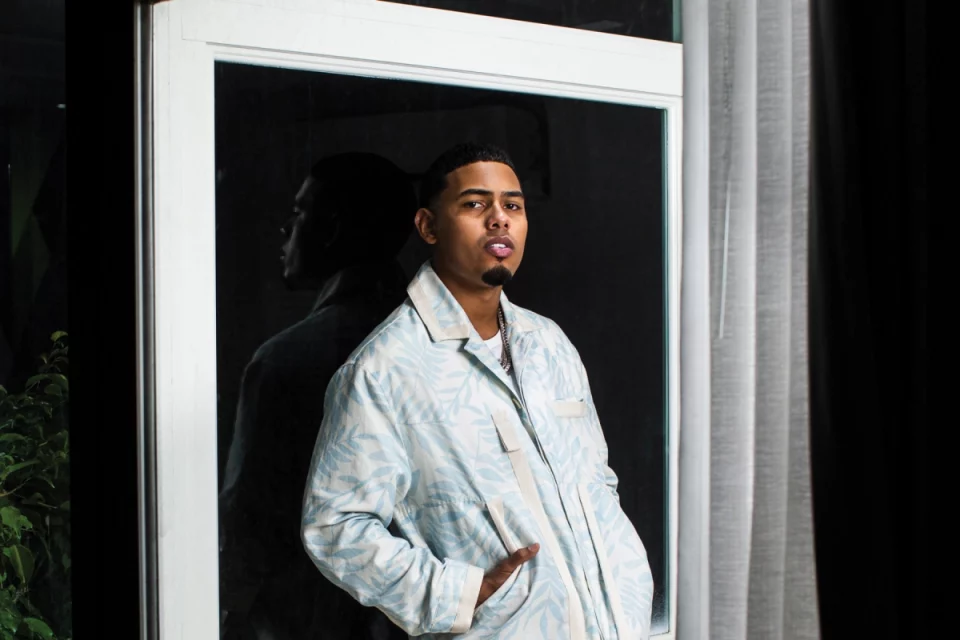‘I Was an Underdog’: How Myke Towers Made the Whole World Listen Up
He never thought he’d be a rapper, but the Puerto Rican artist is one of the deftest lyricists in the game — and he’s just warming up
Myke Towers raps with a natural ease — effortless, fluid, like he was born to do it. Except, when he was growing up in Puerto Rico, being a performer barely crossed his mind. “Music always spoke to me, but I swear to you, I never, ever, ever thought that I was going to be an artist,” he says on a recent phone call from his home on the island. “I thought maybe I’d work in the music industry somehow, but never as a singer or rapper.”
Still, he came from a family of music aficionados — his parents collected CDs, and his grandmother, “the biggest music fan out of all of them,” sang around the house. He loved hip-hop, and he began rapping as a hobby, inspired by his heroes Biggie Smalls, Jay-Z, and Tego Calderon. Around age 18 or 19, he started uploading songs onto SoundCloud with a little more purpose. Even then, he approached music with a bit of hesitancy: He never used his own photos for the track artwork, opting instead for random Google images that kept his identity cryptic.
It only worked for so long. His music made waves in Puerto Rico’s underground, leading to bigger commercial success. Now, Towers — whose real name is Michael Torres — has gone from a reluctant MC to a respected rising star. After closing out 2021 with his first Grammy and Latin Grammy nominations for his LP Lyke Mike, he’s getting ready to release what he hopes will be another smash album in late April.
Towers first broke through with songs like 2016’s hard-scrabble empowerment anthem “Dia De Cobro,” a track that he says was about motivating himself above anything else. “I’d say that when I was first starting out, a lot of people didn’t believe in me. And a lot of people underestimated me — I was an underdog,” he says. “I wanted to show people I was more than what they were expecting, so I sang about that, and I think it inspired a lot of people.” He was prolific over the next four years, releasing mixtapes and songs that established him as one of the most impressive forces in Spanish-language hip-hop. But he also worried about being pigeonholed. “They were looking at me like a mixtape rapper,” he says. “People were like, ‘Yeah, he goes hard, people in the streets love him.’ But something was missing.”
He decided to switch things up and embrace more styles of pop and reggaeton on 2020’s Easy Money Baby without losing the rap essence that defined him. He had an inkling he’d made a smart gamble when he uploaded a preview of the polished song “Si Se Da.” Quickly, the preview hit one million views on Instagram, and hyped-up fans were begging him to drop the full track. The rest of the album — from the twinkling super-hit “La Playa” to the synth-spackled “Diosa” — showed people much more of what he could do. It also opened him up for tons of collaborations, including a few with stars such as Luis Fonsi and Camila Cabello.
But when it was time for a follow-up, Towers did the unexpected again. Rather than continuing down a pop path, he went back to what made him an artist to begin with. He filled his 2021 release Lyke Mike with brash bars and classic hip-hop beats, coming full circle and showcasing his talent as a lyricist in particular. “If there’s something that attracts my longtime fans, it’s that,” he explains. “When people listen to my music, they become aware of the hours dedicated to the writing.” Songs like the salsa-infused “Pin Pin,” which he performed with a full salsa band at the 2021 Latin Grammys, feels like a synthesis of all the sounds he’s been experimenting with, landing on fusions that are upbeat and popular but that also emphasize his unique skills as a rapper.
Towers says his next release, titled Michael, explores more genres and dives deep into where he is in his career. One song, he shares, is all about the struggles he still faces, even after making it this far. “It’s a really personal album,” he says. “It shows everything I can do.” He reflects on other experiences, including becoming a father in 2020 — his son, in fact, was just 20 days old when he was photographed with Towers for the cover of Easy Money Baby. Now, Towers’ work isn’t fueled by the need to prove himself, but by his son. “Everything I’m doing isn’t even for me anymore. It’s all about him.”
From Rolling Stone US.






